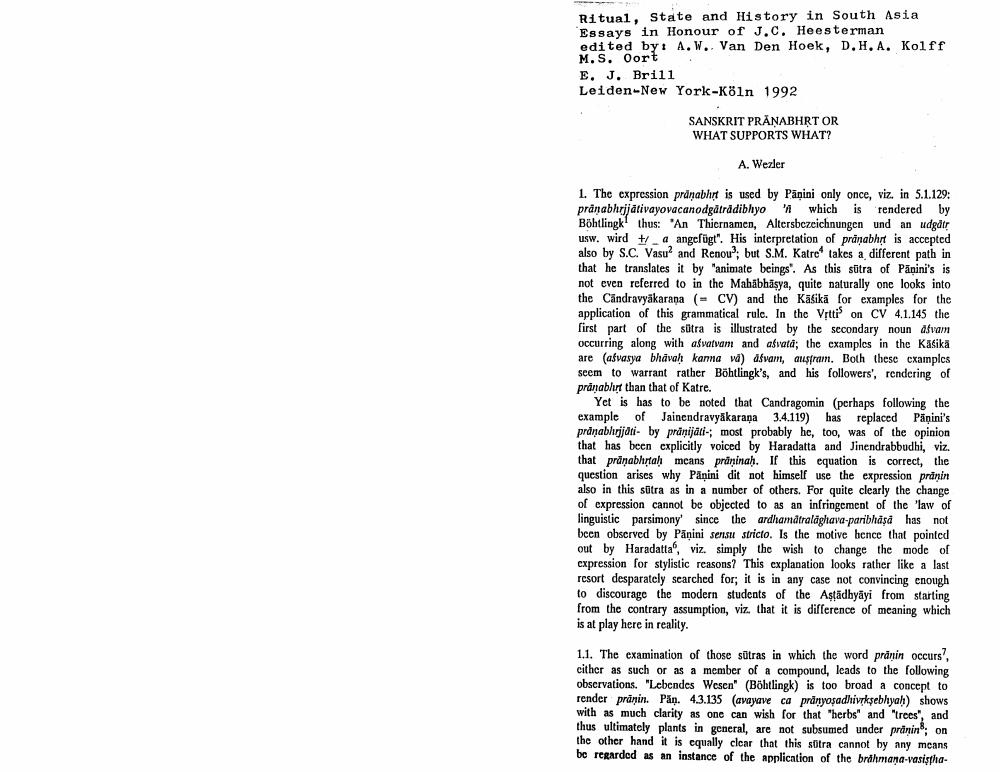Book Title: Sanskrit Pranabhrt Or What Supports what Author(s): A Wezler Publisher: A Wezler View full book textPage 1
________________ Ritual, State and History in South Asia Essays in Honour of J.C. Heesterman edited by: A.W.. Van Den Hoek, D.H.A. Kolff M.S. Oort E, J. Brill Leiden-New York-Köln 1992 SANSKRIT PRĀNABHRT OR WHAT SUPPORTS WHAT? A. Wezler 1. The expression prdnabhrt is used by Panini only once, viz. in 5.1.129: pranabhrjjativayovacanodgatradibhyo " which is rendered by Böhtlingk' thus: 'An Thiernamen, Altersbczcichnungen und an udgdir usw. wird + a angefügt". His interpretation of prāṇabhrt is accepted also by S.C. Vasu and Renou, but S.M. Katre takes a different path in that he translates it by "animate beings. As this sūtra of Pāṇini's is not even referred to in the Mahābhāsya, quite naturally one looks into the Candravyákarana (- CV) and the Kāśikā for examples for the application of this grammatical rule. In the Vrtti on CV 4.1.145 the first part of the stra is illustrated by the secondary noun afvam occurring along with afvatvam and afvata; the examples in the Kasika are (afvasya bhavah karma wa) dfvam, austram. Both these cxamples scem to warrant rather Böhtlingk's, and his followers, rendering of pranablurt than that of Katre. Yet is has to be noted that Candragomin (perhaps following the example of Jainendravyākarana 3.4.119) has replaced Panini's prdnabhrijdti- by pranijddi- most probably he, too, was of the opinion that has been explicitly voiced by Haradatta and Jinendrabbudhi, viz. that prāṇabhrtahmeans praninah. If this equation is correct, the question arises why Pāņini dit not himself use the expression pranin also in this sutra as in a number of others. For quite clearly the change of expression cannot be objected to as an infringement of the law of linguistic parsimony' since the ardhamátralaghava-paribhasa has not been observed by Pāṇini sensu stricto. Is the motive hence that pointed out by Haradatta, viz. simply the wish to change the mode of expression for stylistic reasons? This explanation looks rather like a last resort desparately searched for; it is in any case not convincing cnough to discourage the modern students of the Astādbyāyi from starting from the contrary assumption, viz. that it is difference of meaning which is at play here in reality. 1.1. The examination of those sutras in which the word pranin occurs? cither as such or as a member of a compound, Icads to the following observations. "Lebendes Wesen" (Böhtlingk) is too broad a concept to render pränin. Pan. 4.3.135 (avayave ca prányosadhirksebhyah) shows with as much clarity as one can wish for that "herbs" and "trees, and thus ultimately plants in general, are not subsumed under pranino; on the other hand it is equally clear that this sötra cannot by any means be regarded as an instance of the application of the brahmana-vasishaPage Navigation
1 2 3 4 5 6 7 8 9 10 11
